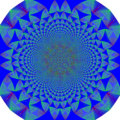#include <stdio.h> #include <stdlib.h> #include <queue> typedef unsigned char byte; typedef std::pair<int,int> coord; const int N = 1024; const size_t C = 4; const size_t S = 28000000; byte M[N][N]; const int dx[4] = {1,0,-1,0}; const int dy[4] = {0,1,0,-1}; int main() { memset(M,0,N*N); for(size_t steps=0;steps<S;++steps) { std::queue<coord> q; if( ++M[N/2][N/2]>=C ) q.push( coord(N/2,N/2) ); while( !q.empty() ) { const int x = q.front().first; const int y = q.front().second; q.pop(); if(M[x][y]<C) continue; M[x][y] -= 4; for(int d=0;d<4;++d) { const int lx = x+dx[d]; const int ly = y+dy[d]; if(lx<0 || lx>=N) continue; if(ly<0 || ly>=N) continue; if(++M[lx][ly]>=C) q.push( coord(lx,ly) ); } } } const byte co[4][3] = { {255,255,255}, {255,0,0}, {0,255,0}, {0,0,255} }; FILE * fo = fopen("backtang2.ppm","wb"); fprintf(fo,"P6\n%d %d\n255\n",N,N); for(int x=0;x<N;++x) for(int y=0;y<N;++y) fwrite(co[M[x][y]],1,3,fo); fclose(fo); return 0; } 



 French
French Deutsch
Deutsch